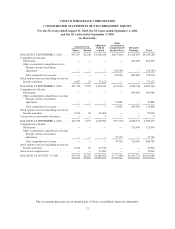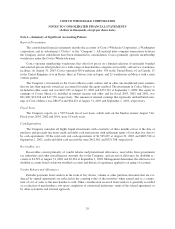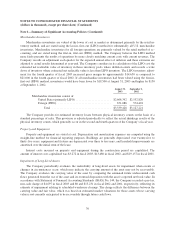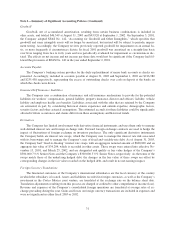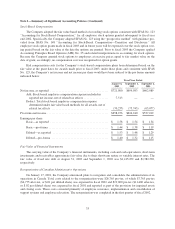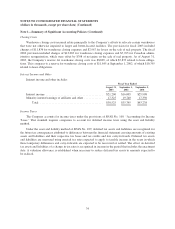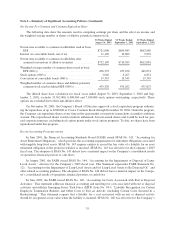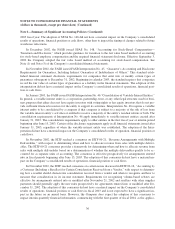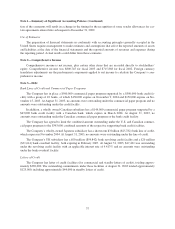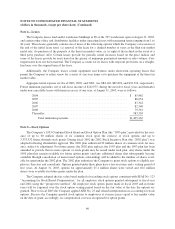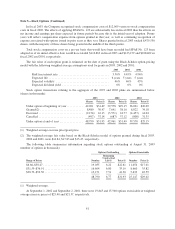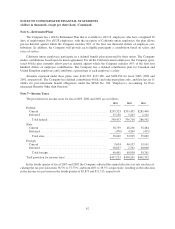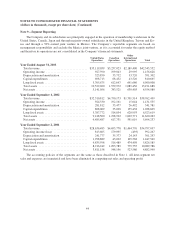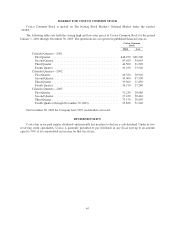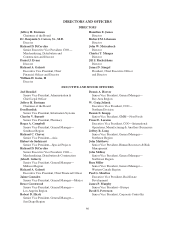Costco 2003 Annual Report Download - page 38
Download and view the complete annual report
Please find page 38 of the 2003 Costco annual report below. You can navigate through the pages in the report by either clicking on the pages listed below, or by using the keyword search tool below to find specific information within the annual report.NOTES TO CONSOLIDATED FINANCIAL STATEMENTS
(dollars in thousands, except per share data) (Continued)
Note 1—Summary of Significant Accounting Policies (Continued)
2003 fiscal year. The adoption of SFAS No. 146 did not have a material impact on the Company’s consolidated
results of operations, financial position or cash flows, other than to impact the timing of charges related to future
warehouse relocations.
In December 2002, the FASB issued SFAS No. 148, “Accounting for Stock-Based Compensation—
Transition and Disclosure,” which provides guidance for transition to the fair value based method of accounting
for stock-based employee compensation and the required financial statement disclosure. Effective September 3,
2002 the Company adopted the fair value based method of accounting for stock-based compensation. See
Note (1) and Note (5) of the Company’s consolidated financial statements.
In November 2002, the FASB issued FASB Interpretation No. 45, “Guarantor’s Accounting and Disclosure
Requirements for Guarantees, Including Indirect Guarantees of Indebtedness of Others.” This standard estab-
lished financial statement disclosure requirements for companies that enter into or modify certain types of
guarantees subsequent to December 31, 2002. Beginning in calendar 2003, the standard requires that companies
record the fair value of certain types of guarantees as a liability in the financial statements. The adoption of this
interpretation did not have a material impact on the Company’s consolidated results of operations, financial posi-
tion or cash flows.
In January 2003, the FASB issued FASB Interpretation No. 46 “Consolidation of Variable Interest Entities.”
In general, a variable interest entity is a corporation, partnership, trust, or any other legal structure used for busi-
ness purposes that either does not have equity investors with voting rights or has equity investors that do not pro-
vide sufficient financial resources for the entity to support its activities. Interpretation No. 46 requires a variable
interest entity to be consolidated by a company if that company is subject to a majority of the risk of loss from
the variable interest entity’s activities or entitled to receive a majority of the entity’s residual returns or both. The
consolidation requirements of Interpretation No. 46 apply immediately to variable interest entities created after
January 31, 2003. The consolidation requirements apply to older entities in the first fiscal year or interim period
beginning after June 15, 2003. Certain of the disclosure requirements apply in all financial statements issued after
January 31, 2003, regardless of when the variable interest entity was established. The adoption of the Inter-
pretation did not have a material impact on the Company’s consolidated results of operation, financial position or
cash flows.
In November 2002, the EITF reached a consensus on EITF 00-21, “Revenue Arrangements with Multiple
Deliverables,” with respect to determining when and how to allocate revenue from sales with multiple deliver-
ables. The EITF 00-21 consensus provides a framework for determining when and how to allocate revenue from
sales with multiple deliverables based on a determination of whether the multiple deliverables qualify to be ac-
counted for as separate units of accounting. The consensus is effective prospectively for arrangements entered
into in fiscal periods beginning after June 15, 2003. The adoption of this consensus did not have a material im-
pact on the Company’s consolidated results of operations, financial position or cash flows.
In November 2002, the EITF reached consensus on certain issues discussed in EITF 02-16, “Accounting by
a Customer (Including a Reseller) for Certain Consideration Received from a Vendor,” with respect to determin-
ing how a reseller should characterize consideration received from a vendor and when to recognize and how to
measure that consideration in its income statement. Requirements for recognizing volume-based rebates are
effective for arrangements entered into or modified after November 21, 2002 and resellers with other supplier
payments should generally apply the new rules prospectively for agreements entered into or modified after De-
cember 31, 2002. The adoption of this consensus did not have a material impact on the Company’s consolidated
results of operations, financial position or cash flows in fiscal 2003 and is not expected to have a significant im-
pact in the future on an annual basis. However, the Company does expect the adoption of this consensus to
impact interim quarterly financial information, commencing with the first quarter of fiscal 2004, as the applica-
36



